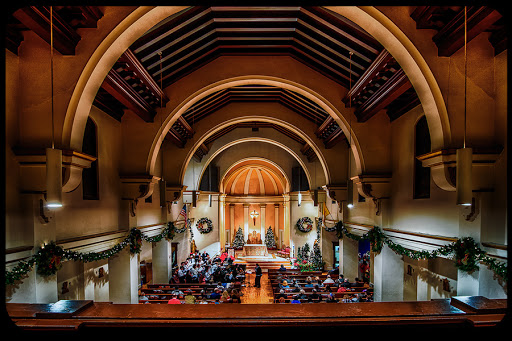Every Sunday, it is the same, brief debate: how far toward the front of the church can we sit? Not shockingly, it’s the kids who always want to sit closer, yet it is those same kids (or, more specifically, their unpredictable behavior) who spur my husband’s nearly desperate need to sit farther toward the relative safety of the back.
Having no dog in the “where do we sit” fight, I watch the whole thing with the detachment of an anthropologist. I stay at home with these children; I homeschool them. I am with them 24/7, so I’m more or less unfazed by the random theological questions (“What makes Lazarus different in nature from a zombie?” or “If someone poisoned the wine before the Consecration, would the Real Presence neutralize it?”), bizarre requests (“I have a mosquito bite right above my butt, can I use your purse to scratch it so people behind me still want to shake hands during the Sign of Peace?”) and horrified realizations that somebody put mismatched shoes on the toddler (probably the toddler). I find if I view Mass with children as a sort of video game, it’s easier — the more cringe-worthy the behavior, the more grace I’m accumulating. Sometimes I can almost see the Grace-O-Meter floating there above the Crucifix, filling up exponentially with every request to bring an empty milk jug to Mass so we can “get enough Holy Water to last us in case of emergency!”
My husband’s inner life does not contain such coping strategies for Mass, however, and so toward the back we sit. It’s fine, really, and it’s just more incentive to get myself to daily Mass, where I can sit as close to the front as I want.
However, even my husband’s love of the backidy back is tested by seating options at the Christmas Eve Masses. Five years we’ve gone to our current parish, and five years we’ve found ourselves in the “no room at the inn” seating area. It’s in the back all right — the very back of the atrium, in folding chairs packed so tightly that none of the kids need to move to be sitting in my lap — they’re already there.
Since we have little children, the late Mass is out of the question, and I’m always too scared of possible Christmas morning mayhem to risk putting Mass off until the 25th.
So that leaves us with the 4:00 or the 6:30 Christmas Eve Mass, which always contains something roughly equal to the total population of my town. It’s hot. It’s loud. At least twice somebody’s fainted and an ambulance has been called. You can’t see Father, and you can’t see the Tabernacle, and expecting regular Mass behavior from the kids just seems pointless, based on the barely contained anarchy you see from the other kids crammed in the back.
I love it.
I always look around the parish at Christmas (and the similarly packed Easter Mass), and marvel at what I’m seeing. Oh, I know there are people who deeply resent the sudden swelling of the ranks during the high holidays, and derisively write off most of the people there as “CEO Christians”, but those thoughts never interest me. One, because I’m always reminded about the parable of the workers in Matthew 20, and two, because there is a far more interesting way to look at the situation.
I look around my temporarily full-to-bursting parish and I see hope. I see people who, for a hundred different reasons, don’t make regular Mass attendance a priority — but do for this day. I see people who probably only step foot in a church for weddings, funerals, and Christmas. I see people who never go to church at all, but are accompanying family members out of love (even if that love is disguised as obligation).
I look around my temporarily full-to-bursting parish and I see hope. I see people who, despite 364 days of absence, still carve out time — during the busiest season of the year — to come and spend a sweaty, cramped hour thanking God for the gift of the Incarnation. I see people who, despite the non-stop, insane droning of secularism and consumerism, hear God’s voice calling to them, and respond by filling pews and folding chairs, putting themselves in front of the Real Presence, even if for only one Mass a year.
Yes, it would be a wonderful thing indeed if parishes were this full every Sunday. Even better, if they were this full daily. But that’s not where we are here in 21st century America. So while it is so tempting to scowl at the Christmas crowds, and sigh at being relegated to the backidy back of a church you attend faithfully, and speculate about the worthiness of the people receiving Eucharist, it is so much more hopeful to give the Christ Child an offering of love by welcoming the stranger. If it helps, remember Mary and Joseph and the inn. See every person in that hot, crowded parish as a weary traveler, looking for refuge, having followed a star that brought them here, to a God who came to us as a tiny child, and who still comes to us as a humble piece of bread.
Welcome the stranger, and you welcome the Christ Child Himself.
Cari Donaldsonis the author of Pope Awesome and Other Stories: How I Found God, Had Kids, and Lived to Tell the Tale. She married her high school sweetheart, had six children with him, and now spends her days homeschooling, writing, and figuring out how to stay one step ahead of her child army. She blogs about faith and family life at clan-donaldson.com.

